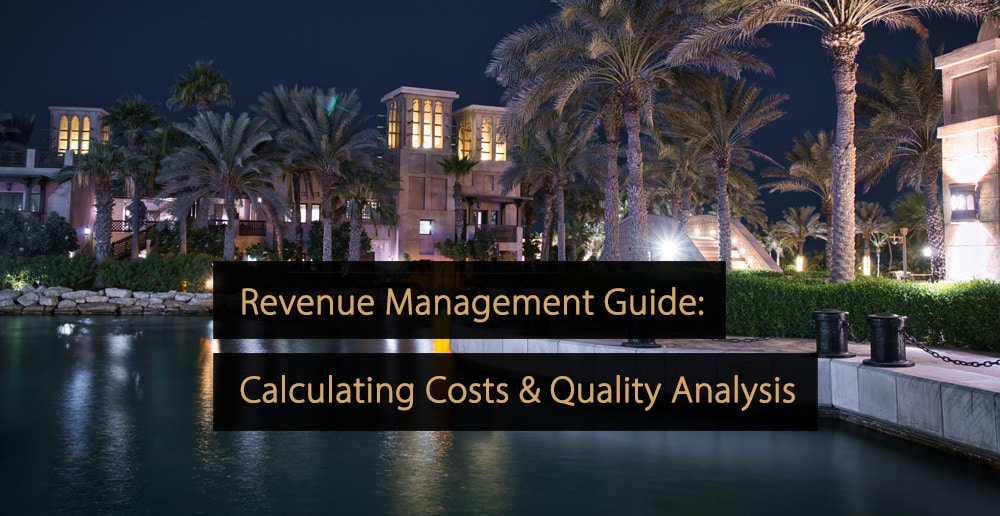Question for Our Revenue Management Expert Panel:
Are Revenue Managers overloaded with strategy and result decisions? How can Revenue Managers collaborate and share responsibilities with other teams? (Question proposed by Daniel Feitosa)
Industry Expert Panel
Our Industry Expert Panel exists out of professionals within the hospitality & travel Industry. They have comprehensive and detailed knowledge, experience in practice or management and are forward-thinking. They are answering questions about the state of the industry. They share their insights on topics like revenue management, marketing, operations, technology and discuss the latest trends.
Our Revenue Management Expert Panel
- Daniel Feitosa – Revenue Management Specialist
- Sandra Gannon – Commercial Consultant, Revenue Puzzle
- Patrick Wimble – Managing Director, Lightbulb Consulting
- Pablo Torres – Director Of Sales Marketing, Alannia Resorts
- Nikolas Hall – Owner, H. Hall Consulting
- Fabian Bartnick – Founder, Infinito
- Silvia Cantarella – Revenue Management Consultant, Revenue Acrobats
- Massimiliano Terzulli – Revenue Management Consultant, Franco Grasso Revenue Team
- Heiko Rieder – Revenue Management Professional
- Jutta Moore – Director, Moore Hotel Consulting
- Daphne Beers – Owner, Your-Q Hospitality Academy
- Mariska van Heemskerk – Owner, Revenue Management Works
- Nikhil Roy – Revenue Management Professional
- Yash Taneja – Revenue Manager, IHG Hotels & Reports
- Ask Our Panel a Question
- Join Our Expert Panel
“Communication between all areas is a real need. The staff must share knowledge to get better results. Revenue Management’s strategy should consider contributions from all areas, and by doing so, all staff can contribute to the common need: achieving goals and increasing revenue.
If RMs start a communication culture that supported by the leaders of all areas (including the GM and the C level), it is better to share the opportunities and the actions that should be taken, involving all areas and bringing them together to show results, opinions and challenges.
When RM is the department which has the only/main responsibility to show strategies and results, the hotels are missing a lot of opportunities, time and evolution chances.”
“The approach needs to be a total revenue management approach and the entire senior team (on behalf of their total team) needs to take ownership. The most important skill is communication so that all teams know what is expected from them in terms of strategy and result decisions. The approach needs to be holistic and open. However, we need to agree on a consistent source of data on which the decisions are being made. Once decisions are made, they need to be implemented and trialled – everybody needs to be part of the evaluation in their area.”
“I would argue that strategy and result decisions are exactly the type of decisions a revenue manager should be taking. If you are struggling to make these decisions, look at what your “time-suckers” are. For example, if you are constantly having to override a revenue management system because the price points are “wrong”, ask “what do I need to do to make the price points more accurate”?
If there is a need for constant analysis to justify decisions ask, “What do I need to do to give people the insight they need to support my decisions”? The answer might lie in delegating the tasks that suck your time or collaborating with someone else who might be better at delivering certain aspects than you. Just because it is revenue management, doesn’t mean you have to do it all!”
“Revenue Managers must focus on profitability, and for that, they should work hand in hand with Sales, Marketing and Finance. Creating a cross-functional working group with shared and common goals can be a great step towards breaking the silos and having a unified strategy.”
“Identifying & understanding the goal – we have struggled with effectively ensuring seamless collaboration between our various departments, resulting in a lack of efficiency and loss of revenue opportunity.
We need to look at building a single-minded revenue-generating organisation whose responsibility is acquiring and retaining guests, optimising performance and exploring all possible revenue opportunities.
Changing the entire mindset with clear and concise communication across the organisation, empowering and embracing the entire organisation in revenue strategies, and ensuring a collaborative effort in achieving the desired goals. “Easier said than done”.
That said we don’t need endless meetings with “graphic details” to achieve this. Informal chats during the course of the day – at the copy machine, in the canteen – are where we can freely discuss the challenges our business is facing, brainstorm crazy ideas or share observations.
You can pick the brains of your colleagues from housekeeping to reservations to get an inside look at how you can maximise your revenue and improve your guests’ experiences. When it comes to brainstorming – No ideas are bad ideas!”
“Revenue Managers are not overloaded, they are mismatched from a skill perspective. We elevated RMs into leadership positions and gave them responsibilities that as a function we could not deliver on. And this is by no means a fault of the hotels but more of the fact that revenue management itself doesn’t know what it wants: Data geek, storyteller, commercial head, strategist?!?!”
“I think we should stop focusing too much on single departmental goals and objectives. We have been talking for years about the importance of breaking the silos and developing a strategy where all commercial departments of the hotel (sales, revenue, digital, marketing…) work together towards the same goal: profit. If we finally switch to this mentality and recognize that the revenue manager, as the owner of the data, can be a sort of “captain of the ship”, we also recognise that the ship cannot reach a safe haven without a crew.
So the answer is very simple: break the silos, share the data, leverage your respective strengths and move in unison towards one common goal.”
“Revenue managers must share decisions and responsibilities with other key departments of the hotel, such as the sales and marketing department, the general manager, the front desk, the housekeeping, the restaurant etc. Everyone must converge towards the same goal, which is the achievement of a positive GOP, the improvement of historical results and brand reputation. The work of the revenue manager, however efficient and precise, is insufficient and limited if there is no collaboration and commitment on the part of the other departments.
If the housekeeping staff is unmotivated, the rooms probably won’t be clean at their best, if the front desk staff is rude or the restaurant service is inadequate, guests will be dissatisfied and leave bad reviews. This will clearly affect the online reputation score, the visibility, the conversion rate, the number of bookings and the potential selling rates accepted by the market, therefore the daily work of the revenue manager.”
“In today’s unpredictable times it is more important than ever for revenue managers to monitor the current trends closely and to frequently adapt tactical campaigns, pricing and forecast. Furthermore, for revenue managers, it is vital to share all observations with the remaining commercial teams. Sharing or delegating responsibilities depends on the current set of responsibilities. Revenue Management is interpreted differently and so are responsibilities.
The priority should now be to prepare a holistic commercial strategy for the future, together with the other business development teams. A the interface to most commercial aspects, the revenue manager should be in the lead position here. In order to make room for the shift towards a more strategic workload (and to also prepare for the shortage of skilled people in the industry) the revenue manager’s daily, repetitive tasks should be automated as much as possible and, where this is not possible, coached to more junior colleagues. Aside from making more room for strategic tasks it also comes with the upside that upskilling takes place in junior positions.”
“It’s important for Revenue Managers to work closely with the commercial teams to ensure that strategies are aligned and no one is working in silos. Results and data about which segmentation will drive the most profit should be shared across the teams. Responsibilities can be shared across departments: for example, Sales can be responsible for competition checks & updates with regards to STR performance, whereas Digital should contribute all the Website & booking engine performance, like conversion rates, website effectiveness and look-to-book ratio.”
“I think it is heavily important to create ownership, trust and cooperation with sales, marketing, reservations and OPS. First you need to make sure that everyone has the same goals and is aware of them! This requires clear communication before training and developing your teams in what actually contributes to the top-line revenues and why THEY are important. If you show them the results they bring to the company, they will feel engaged, motivated and proud of it and that will make them want to achieve more. (It will also improve retention and employee loyalty.)
Work together towards the same goals and ask for their input when making budgets, forecasts etc. Challenge them to get creative and also support them in reporting, analysis and feedback. Use the potential of your colleagues to create a result-driven operation, rather than a task-driven operation. This is the key to success!
And finally, celebrate successes and achievements (successes are not only wanted results, but all actions taken, all lessons learned and all identified mistakes and key learnings from them). If you motivate others according to this definition of success, you will have a team that goes skyrocketing towards the goals and overdeliver for sure – even in challenging times!”
“Revenue Managers have a key role in strategy and result decisions but also rely on all other departments. They are often at the start of the decision-making process as they should have access to key data and should have a skill set that allows them to make a thorough analysis of that data. With this, they can draw conclusions and point out where the opportunities and threats lie.
Then, as a team, using everyone’s strengths, they should determine the best business mix for the hotel and they then need to combine this data with the information / intelligence coming from the other departments. Keeping everyone informed throughout the entire process is important to keep having the same common goals.”
“I do feel this is true. However, it depends on the organization and if they have a separate strategy within the Sales and Marketing team. For smaller properties, I believe it is highly essential for the RM to collaborate with Sales and also with the management on a weekly basis.
Alignment is key. Once the departments share information, then each of them can work towards a common goal. Collaboration can be as simple as having a weekly round-up with the Revenue, S&M and Strategy leaders where performance data is shared and a path forward is discussed for the coming weeks.”
“The workload is more for sure as there are lots of responsibilities given to Revenue Managers. The old saying of Revenue Managers being in charge of rooms revenue is non-existent as revenue managers are now involved in sales activities, marketing and other departmental strategies.”
Ask a Question & Join Our Expert Panel
Would you like a question to be answered by our Industry Expert Panel? Or would you like to join our community of experts and share your experience, insights, and knowledge with fellow industry professionals? Via the buttons below you can submit a question or submit a request to become part of our expert panel.
More Tips to Grow Your Business
Revfine.com is the leading knowledge platform for the hospitality and travel industry. Professionals use our insights, strategies, and actionable tips to get inspired, optimize revenue, innovate processes, and improve customer experience.Explore expert advice on management, marketing, revenue management, operations, software, and technology in our dedicated Hotel, Hospitality, and Travel & Tourism categories.





















Leave A Comment